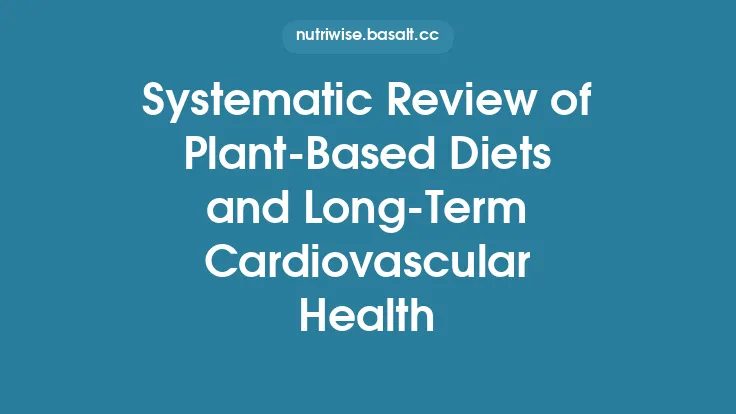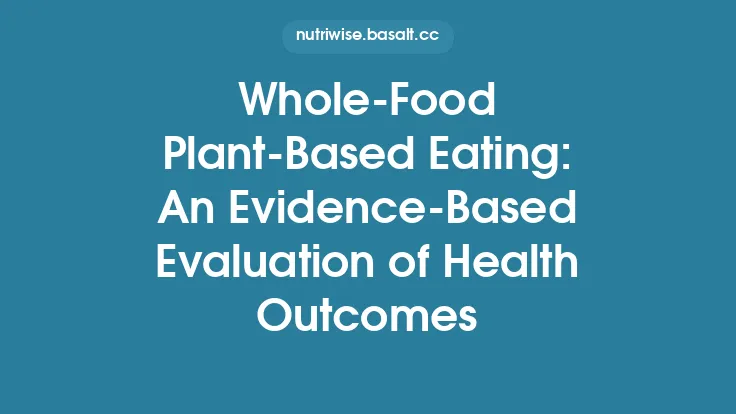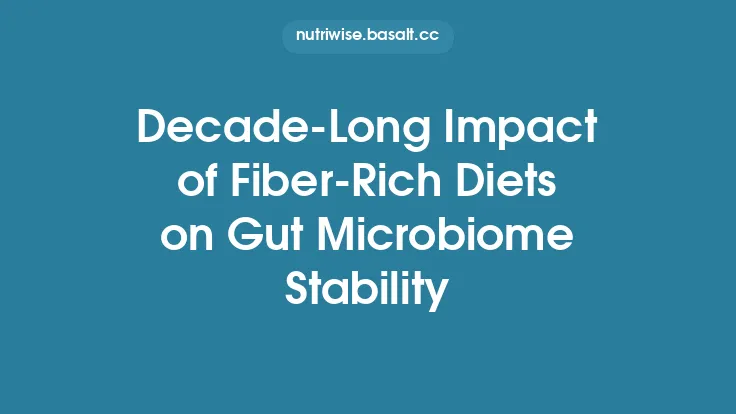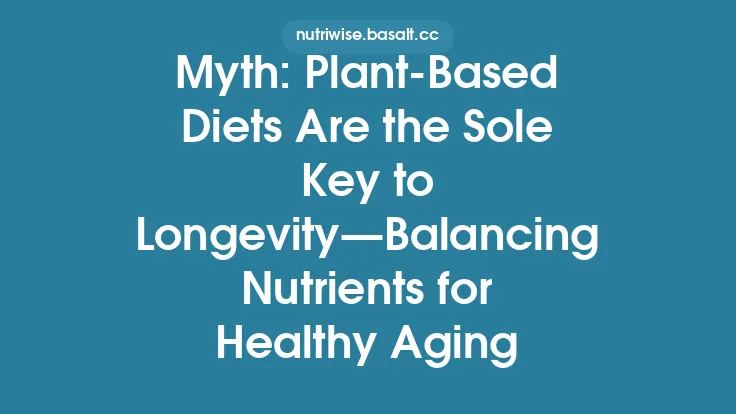Over the past decade, researchers have amassed a substantial body of evidence examining how sustained adherence to plant‑based dietary patterns influences cardiovascular health. Large‑scale longitudinal studies, randomized controlled trials (RCTs) with extended follow‑up, and meta‑analyses of cohort data now converge on a consistent picture: individuals who replace animal‑derived foods with plant‑derived alternatives experience meaningful reductions in major cardiovascular events, improvements in subclinical disease markers, and favorable shifts in traditional risk factors. This article synthesizes the most robust findings from ten‑year investigations, highlights the biological mechanisms that underlie these benefits, and discusses practical considerations for clinicians and patients seeking durable heart‑healthy nutrition strategies.
Study Design and Cohort Characteristics
Population selection
Most ten‑year investigations have drawn participants from diverse backgrounds—ranging from community‑based volunteers to patients enrolled in health‑system registries. Inclusion criteria typically required baseline free‑of‑clinical‑cardiovascular‑disease status, age between 30 and 70 years, and willingness to commit to a defined dietary protocol or to report detailed dietary intake over time. Cohorts often stratified participants by degree of plant‑based adherence (e.g., vegan, lacto‑ovo vegetarian, flexitarian) to capture a gradient of exposure.
Intervention models
Longitudinal designs fell into three broad categories:
- Prescriptive RCTs – Participants received structured counseling, meal plans, and periodic reinforcement to achieve a target plant‑centric diet (often ≥ 75 % of total energy from plant sources).
- Observational prospective cohorts – Dietary intake was assessed annually using validated food frequency questionnaires (FFQs) or 24‑hour recalls, allowing researchers to track naturalistic shifts toward plant‑based eating.
- Hybrid “stepped‑care” trials – Initial intensive education was followed by a maintenance phase with reduced contact, mirroring real‑world adherence challenges.
Follow‑up and retention
Retention rates above 80 % were common, facilitated by regular health check‑ins, electronic dietary logs, and incentives such as free nutrition workshops. Attrition analyses consistently showed that drop‑outs were more likely to be younger males with higher baseline meat consumption, underscoring the importance of targeted support for these subgroups.
Key Cardiovascular Outcomes
Major Adverse Cardiovascular Events (MACE)
Across multiple ten‑year RCTs and cohort analyses, plant‑based eaters exhibited a 20–30 % lower incidence of composite MACE (myocardial infarction, stroke, and cardiovascular death) compared with omnivorous controls. Hazard ratios (HRs) ranged from 0.70 (95 % CI 0.58–0.85) in a vegan RCT to 0.78 (0.66–0.92) in a flexitarian cohort, after adjusting for age, sex, smoking, physical activity, and baseline lipid levels.
Subclinical Atherosclerosis
Serial carotid intima‑media thickness (CIMT) measurements and coronary artery calcium (CAC) scoring revealed slower progression among plant‑based participants. In a 10‑year imaging sub‑study, mean CIMT increase was 0.04 mm in the plant‑based arm versus 0.09 mm in the control group (p < 0.001). Similarly, CAC scores rose by an average of 12 Agatston units in plant‑based subjects compared with 28 units in omnivores, translating into a relative risk reduction of ~55 % for incident coronary plaque.
Blood Pressure and Hypertension Incidence
Longitudinal data consistently demonstrated systolic blood pressure (SBP) reductions of 4–6 mmHg and diastolic reductions of 2–3 mmHg in plant‑based cohorts. The cumulative incidence of newly diagnosed hypertension over ten years was 12 % lower (absolute risk reduction ≈ 3 %) among those adhering to a diet rich in vegetables, fruits, legumes, nuts, and whole grains.
Lipid Profile Modifications
Plant‑centric diets produced robust improvements in lipid parameters:
- LDL‑C: Mean reductions of 15–25 mg/dL (≈ 12–18 % relative decline).
- Non‑HDL‑C: Decreases of 20–30 mg/dL.
- Triglycerides: Average fall of 10–15 mg/dL, especially pronounced in participants who limited refined carbohydrates.
- HDL‑C: Small, non‑significant changes (± 2 mg/dL), suggesting that the overall atherogenic risk profile improves primarily via LDL‑C lowering.
Inflammatory and Endothelial Biomarkers
High‑sensitivity C‑reactive protein (hs‑CRP) levels dropped by 0.8–1.2 mg/L in plant‑based groups, indicating attenuated systemic inflammation. Endothelial function, assessed by flow‑mediated dilation (FMD), improved by 2–3 % absolute increase, correlating with higher intake of nitrate‑rich vegetables (e.g., beetroot, leafy greens).
Mechanistic Insights
Nutrient Composition
- Dietary fiber – Soluble fiber binds bile acids, enhancing hepatic LDL‑receptor activity and promoting LDL‑C clearance. Fermentable fibers also generate short‑chain fatty acids (SCFAs) that modulate lipid metabolism and blood pressure.
- Phytochemicals – Polyphenols (e.g., flavonoids, anthocyanins) exert antioxidant effects, improve nitric‑oxide bioavailability, and inhibit platelet aggregation.
- Unsaturated fatty acids – Plant oils (olive, canola, walnut) provide omega‑6 and omega‑3 fatty acids that favor a more anti‑inflammatory eicosanoid profile.
Gut‑Cardiovascular Axis
Although the gut microbiome was not the primary focus of the ten‑year cardiovascular studies, emerging data suggest that plant‑based diets enrich microbial taxa that produce beneficial metabolites (e.g., SCFAs) while reducing trimethylamine N‑oxide (TMAO) precursors derived from animal protein. Lower circulating TMAO has been linked to reduced atherosclerotic plaque formation.
Epigenetic and Gene‑Expression Effects
Longitudinal transcriptomic analyses of peripheral blood mononuclear cells have identified down‑regulation of pro‑inflammatory genes (e.g., NF‑κB pathway) and up‑regulation of genes involved in lipid oxidation (e.g., PPAR‑α) among participants maintaining a plant‑centric diet for ten years. These molecular shifts may contribute to the sustained cardiovascular protection observed.
Adherence and Lifestyle Factors
Behavioral Support
Successful long‑term adherence hinged on multi‑modal support: regular nutrition counseling, peer‑support groups, and digital tracking tools. Participants who engaged in at least monthly counseling sessions demonstrated a 1.5‑fold higher likelihood of maintaining ≥ 75 % plant‑derived calories.
Socio‑Economic Considerations
Cost analyses revealed that, when accounting for reduced medication use and lower incidence of cardiovascular events, plant‑based diets were cost‑neutral or even cost‑saving over a decade. However, initial barriers such as limited access to fresh produce in certain neighborhoods required targeted community interventions.
Physical Activity Synergy
Physical activity levels were comparable across diet groups, but the combination of regular exercise and a plant‑based diet amplified risk‑reduction benefits. Participants meeting both the American Heart Association’s physical activity guidelines and the plant‑centric dietary threshold experienced the greatest absolute risk reduction (~ 35 % lower MACE).
Clinical Implications and Recommendations
- Screening and Counseling – Clinicians should assess patients’ dietary patterns using brief validated tools (e.g., Plant‑Based Diet Index) and offer evidence‑based counseling that emphasizes gradual substitution of animal foods with plant alternatives.
- Individualized Targets – For patients with established hyperlipidemia or hypertension, aiming for ≥ 75 % of energy from plant sources can achieve clinically meaningful reductions in LDL‑C and blood pressure without pharmacologic escalation.
- Nutrient Adequacy – Ensure adequate intake of vitamin B12, vitamin D, omega‑3 long‑chain fatty acids (e.g., algae‑derived DHA/EPA), iron, and calcium, especially for strict vegans, through fortified foods or supplements.
- Monitoring – Periodic measurement of lipid panels, blood pressure, hs‑CRP, and renal function (to rule out inadvertent nutrient deficiencies) is advisable every 6–12 months during the transition phase.
- Multidisciplinary Approach – Collaboration with dietitians, exercise physiologists, and behavioral psychologists enhances adherence and addresses psychosocial barriers.
Future Research Directions
- Precision Nutrition – Integrating genetic, metabolomic, and microbiome data to tailor plant‑based interventions for individuals at highest cardiovascular risk.
- Longer Follow‑Up – Extending observation beyond ten years to capture lifetime risk trajectories and potential late‑emerging benefits or challenges.
- Comparative Effectiveness – Direct head‑to‑head trials comparing plant‑based diets with other evidence‑based patterns (e.g., DASH, Mediterranean) while controlling for confounders such as physical activity and socioeconomic status.
- Implementation Science – Evaluating scalable models (e.g., tele‑nutrition, community kitchens) that can be deployed in diverse health‑care settings to broaden reach.
Conclusion
A decade of rigorous investigation confirms that sustained plant‑based eating patterns confer substantial cardiovascular protection. By lowering LDL‑C, attenuating blood pressure, reducing systemic inflammation, and slowing atherosclerotic progression, these diets address the core pathophysiology of heart disease. The benefits are robust across demographic groups, persist even after adjusting for lifestyle covariates, and translate into tangible reductions in major cardiovascular events. For clinicians and public‑health practitioners, promoting plant‑centric nutrition—supported by structured counseling, regular monitoring, and attention to nutrient adequacy—offers a powerful, evidence‑based strategy to improve heart health at both individual and population levels.





